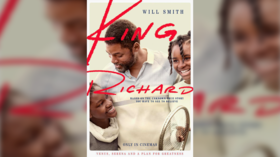The movie focuses on an inspiring American dream come true and thankfully avoids racial pandering and celebrating victimhood.
As neither a fan of the Williams sisters nor of Will Smith, I expected to dislike King Richard, the new biopic starring Smith as Richard Williams, the father of tennis prodigies Venus and Serena Williams, who aided his daughters as they navigated the violence of gang-infested Compton, California, and the entitlement of the lily-white tennis world.
I assumed the film, executively produced by the Williams sisters, would sing the same tune that Venus and Serena and their fans often croon, namely crying racism over the most banal of critiques and shamelessly playing the victim card whenever possible.
But then I watched the movie and was pleasantly surprised by the appeal of its broad-based message and how moderately enjoyable I found it to be.
To be clear, King Richard, currently in theatres and streaming on HBO Max, is not a great movie or artistic achievement. It’s a formulaic, relentlessly middlebrow, crowd-pleasing sports movie/biopic that is devoid of any true suspense or tension as we all know how the story turns out, with Richard crowned the king of the sports dads as Venus and Serena win 30 Grand Slam singles titles between them.
The sports movie/biopic genre almost always demands that the rough edges of its characters be smoothed away in order to make the simplistic story go down smoother with audiences, and King Richard is no exception.
In real life, Richard Williams is a much more complicated man than the hagiography of King Richard would ever explore. For instance, Richard has always been a force of nature when it comes to protecting his daughters and advancing their careers, but he’s also a philanderer who has fathered children with other women and is prone to levels of self-aggrandizement and egotism that would make Barnum and Bailey blush.
But with all that said, the most compelling thing about the movie is that it’s an all-American story about a dedicated working-class guy who dreamed up his daughter’s tennis dominance even before they were born, wrote it out in a 78-page manifesto, and then went out and moved heaven and earth to make it happen.
Richard was driven, maniacal and controlling when it came to his daughters, and pushed them extremely hard, and despite, or maybe even because of, their race, they became ridiculously successful and wealthy, and unlike say, Tiger Woods, they did so without becoming self-destructive.
That’s an incredible story, Shakespearean in its family dynamics and emotional power, and while King Richard is a better story than it is a movie, that story is powerful enough to make the movie worth watching.
As it is in nearly everything these days, the specter of racism is certainly present in the film, but considering the hyper-sensitive, victimhood-celebrating, grievance culture in which we live, it is never egregiously heavy-handed.
In fact, one of the more fascinating revelations in the film is that the Williams family had as many obstacles to overcome in their black community of Compton in the form of violence, jealousy and negativity, as they did in the parochial, white-dominated infrastructure of the tennis world.
When the notion of racism does bubble to the surface, it does so in ways that aren’t so, well, black and white. For example, there’s a scene smack dab in the middle of the movie where Richard becomes incensed when a white agent who is trying to sign Venus Williams says that what Richard has accomplished with his daughters is “incredible.”
An offended Richard cuts through the niceties of this business meeting and rants at the agent that the only reason he used the word “incredible” is because of Richard’s race. When the agent protests this charge, Richard defiantly farts and indignantly walks away.
What is so striking about this scene is that literally the only reason there’s a movie about Richard Williams’ “incredible” accomplishment is because he and his daughters are black. This is why we aren’t watching a biopic about Martina Navratilova’s father, or Chris Evert’s father, or Roger Federer’s father. Richard Williams has built an entire brand and persona around him and his daughters overcoming the supposed limitations imposed on them because of their race, and King Richard is proof of that.
This scene feels insightful, even if unintentionally so, as it perfectly sums up the current minefield of racial dialogue, where no matter what a white person says, it’s twisted into being perceived as racist.
As for Will Smith, I’ve always found him to be one of the more grating entities in entertainment. His acting, just like his insipidly embarrassing music, is always manipulative and manufactured, as is his persona.
Thankfully, in King Richard, Smith doesn’t so much make his cheesiness disappear as he does mute it. His performance isn’t transcendent or even all that good, but thankfully, it isn’t distracting. For his middling efforts, I’m sure he’ll be rewarded with an Academy Award come Oscars time.
As for King Richard, while it isn't a great film, it is an inspiring one. Hopefully, audiences learn the proper lesson of the value of hard work, self-discipline and familial love from the movie, as opposed to it inspiring a cavalcade of parents/coaches to try and turn their poor kids into lottery tickets through sports.
Ultimately, the best thing about King Richard is that it’s a benign, mildly entertaining, family-friendly movie that people of varying philosophical dispositions and artistic tastes gathering together for the holidays can watch without having it spark arguments. That’s no small feat and something for which to be thankful in these polarizing times.
Like this story? Share it with a friend!


















